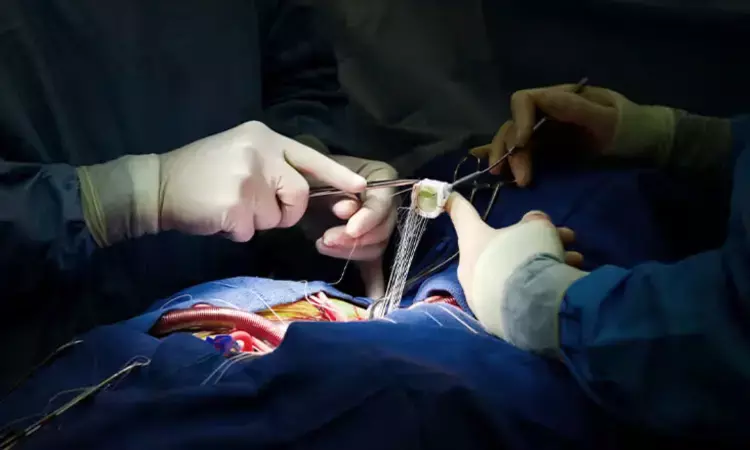- Home
- Medical news & Guidelines
- Anesthesiology
- Cardiology and CTVS
- Critical Care
- Dentistry
- Dermatology
- Diabetes and Endocrinology
- ENT
- Gastroenterology
- Medicine
- Nephrology
- Neurology
- Obstretics-Gynaecology
- Oncology
- Ophthalmology
- Orthopaedics
- Pediatrics-Neonatology
- Psychiatry
- Pulmonology
- Radiology
- Surgery
- Urology
- Laboratory Medicine
- Diet
- Nursing
- Paramedical
- Physiotherapy
- Health news
- Fact Check
- Bone Health Fact Check
- Brain Health Fact Check
- Cancer Related Fact Check
- Child Care Fact Check
- Dental and oral health fact check
- Diabetes and metabolic health fact check
- Diet and Nutrition Fact Check
- Eye and ENT Care Fact Check
- Fitness fact check
- Gut health fact check
- Heart health fact check
- Kidney health fact check
- Medical education fact check
- Men's health fact check
- Respiratory fact check
- Skin and hair care fact check
- Vaccine and Immunization fact check
- Women's health fact check
- AYUSH
- State News
- Andaman and Nicobar Islands
- Andhra Pradesh
- Arunachal Pradesh
- Assam
- Bihar
- Chandigarh
- Chattisgarh
- Dadra and Nagar Haveli
- Daman and Diu
- Delhi
- Goa
- Gujarat
- Haryana
- Himachal Pradesh
- Jammu & Kashmir
- Jharkhand
- Karnataka
- Kerala
- Ladakh
- Lakshadweep
- Madhya Pradesh
- Maharashtra
- Manipur
- Meghalaya
- Mizoram
- Nagaland
- Odisha
- Puducherry
- Punjab
- Rajasthan
- Sikkim
- Tamil Nadu
- Telangana
- Tripura
- Uttar Pradesh
- Uttrakhand
- West Bengal
- Medical Education
- Industry
Early Postoperative Atrial Fibrillation Tied to Increased Long-Term Mortality After Cardiac Surgery: Study

Researchers have found in a new study that early postoperative atrial fibrillation (POAF) following cardiac surgery is significantly associated with higher long-term mortality, though not with an increased risk of late stroke, after adjusting for demographic and clinical factors.
Early postoperative atrial fibrillation (early-POAF) is the most common complication after cardiac surgery. Although prior studies have demonstrated an association between early-POAF and late outcomes, it is questionable whether these long-term adverse events result from early-POAF or from comorbidities that underlie the development of early-POAF. Therefore, the aim of this study was to investigate the association of early-POAF with late mortality and stroke after adjustment for age and cardiovascular comorbidities.
A systematic search was conducted to identify studies reporting on late mortality after cardiac surgery in patients with and without early-POAF. Articles presenting Kaplan–Meier were included for a pooled analysis of late mortality (primary outcome) and stroke (secondary outcome). Individual time-to-event data were reconstructed from the Kaplan–Meier curves and incorporated into a multivariable mixed-effects Cox model. Results: In total, 33 studies were included in the analysis for late mortality (131 031 patients) and 10 studies in the analysis for late stroke (42 042 patients).
Overall, 36 991 patients had early-POAF with a pooled incidence of 31.5% (95% CI: 27.7 to 35.6%). Unadjusted analysis showed that early-POAF was significantly associated with late mortality (Hazard Ratio [HR] = 1.62, 95%CI: 1.58–1.67, P < 0.001) and late stroke (HR = 1.72, 95%CI: 1.61–1.85, P < 0.001). Early-POAF was significantly associated with late mortality (adjusted HR = 1.19, 95% CI: 1.07–1.33, P = 0.002), but not with late stroke (adjusted HR = 1.14, 95% CI: 0.96–1.35, P = 0.122) after adjustment for age, comorbidities, surgery type, and the random effects term. Early-POAF after cardiac surgery is significantly associated with late mortality, but not with late stroke, after adjustments for age, sex, cardiovascular comorbidities, and type of surgery.
Reference:
Kawczynski, M.J., van der Heijden, C.A., Maessen, J.G. et al. Early postoperative atrial fibrillation is associated with late mortality after cardiac surgery: a systematic review and reconstructed individual patient data meta-analysis. J Cardiothorac Surg 20, 265 (2025). https://doi.org/10.1186/s13019-025-03504-9
Dr. Shravani Dali has completed her BDS from Pravara institute of medical sciences, loni. Following which she extensively worked in the healthcare sector for 2+ years. She has been actively involved in writing blogs in field of health and wellness. Currently she is pursuing her Masters of public health-health administration from Tata institute of social sciences. She can be contacted at editorial@medicaldialogues.in.
Dr Kamal Kant Kohli-MBBS, DTCD- a chest specialist with more than 30 years of practice and a flair for writing clinical articles, Dr Kamal Kant Kohli joined Medical Dialogues as a Chief Editor of Medical News. Besides writing articles, as an editor, he proofreads and verifies all the medical content published on Medical Dialogues including those coming from journals, studies,medical conferences,guidelines etc. Email: drkohli@medicaldialogues.in. Contact no. 011-43720751


